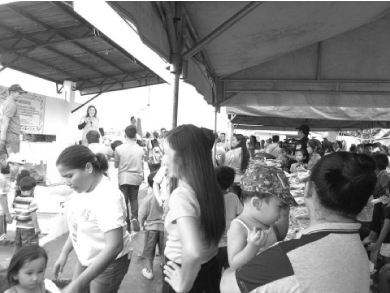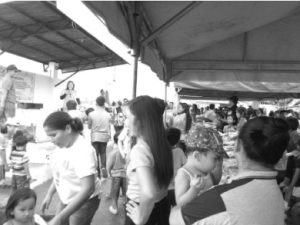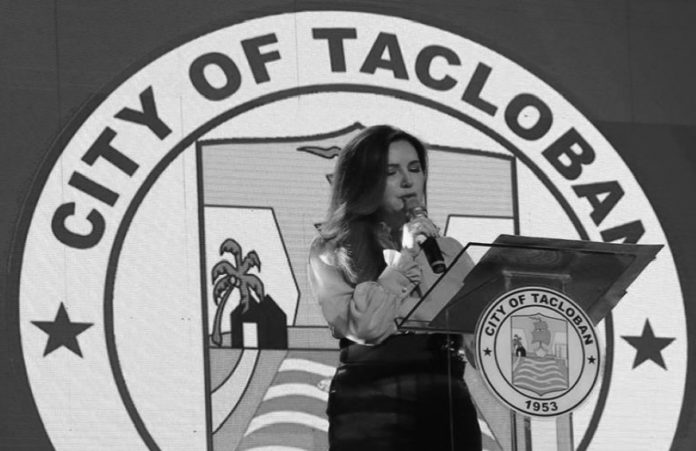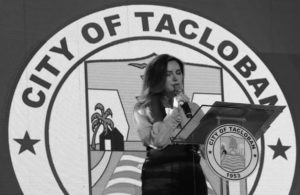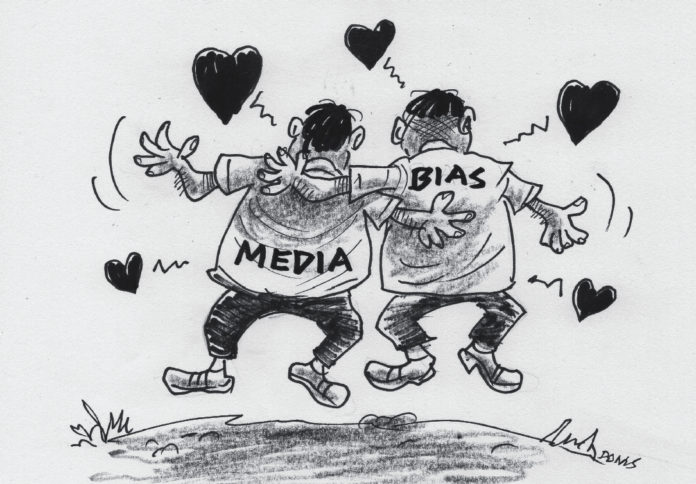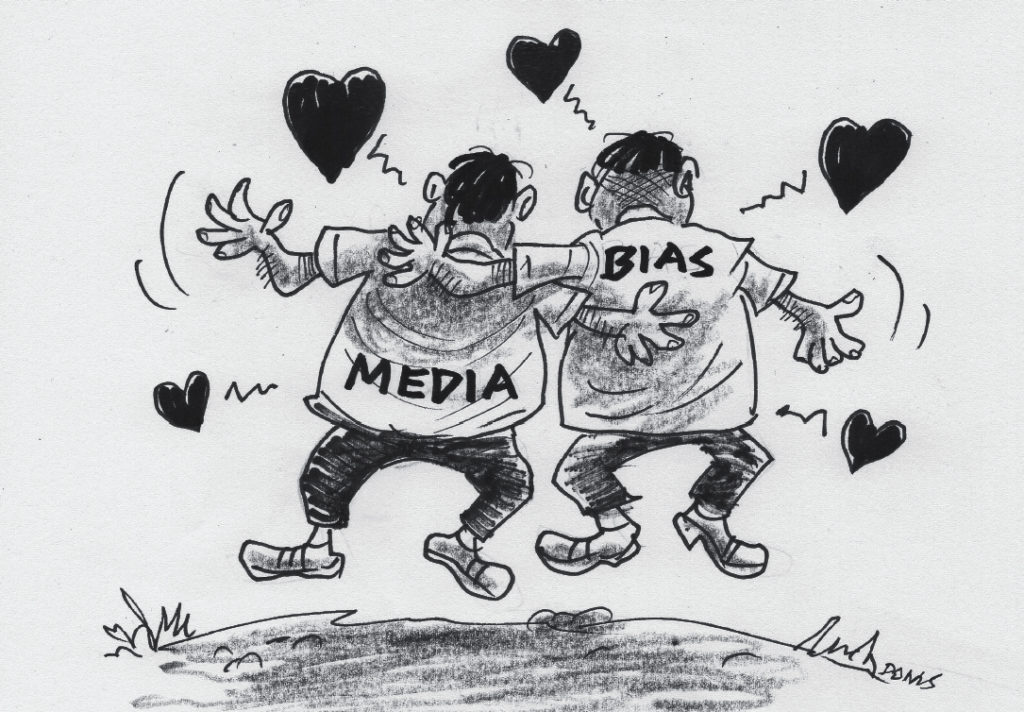TACLOBAN CITY- There were singing and dancing punctuated with laughters and wild cheers from the villagers of Barangay 66-A in Anibong district, this city, as the members of the Alpha Phi Omega United International Organization, Inc. Visayas Council-Tacloban chapter, conducted their regular community service project in the said coastal village on November 10.
Incidentally, the activity took place just two days after the country marked the fifth year anniversary of super typhoon ‘Yolanda’ that barreled its way in the region, particularly Tacloban City, considered as the ground zero of the world’s strongest typhoon to hit inland on November 8, 2013.
Delia Bato, the village chair, said that they are just grateful that the organization chose their village of more than 1,500 residents of their community service project.
“This is a depressed area with most of the residents are considered as indigents. We are really thankful to them for coming here and giving us some joy. We felt privilege for this,” Bato said.
Boots Palconite-Buena, who spearheaded the group’s activity, said that they have been visiting various villages in the city to conduct their outreach program as part of their corporate social responsibility.
Barangays located along the coast were the most affected areas when Tacloban was pummeled by the super typhoon as they were directly hit by the storm surge spawned by Yolanda.
‘We’ve been doing this activity for years now in coastal areas in the city from San Jose to (Sagkahan) astrodome,” she said.
“This is part of our corporate social responsibility because one of our missions is to serve God, country, people, and nature,” Palconite-Buena added.
The members of the organization pooled their resources together to finance their community programs to the villages.
Palconite-Buena, a member of the Board of Trustees for Visayas Council, Tacloban chapter, said that their activity was held coinciding with the anniversary of Yolanda’s onslaught.
Aside from providing slippers, as part of Palconite-Buena’s ‘Sapin Sa Paa’ project, residents of Brgy. 66-A, who attended the activity were provided with a hot arroz caldo, a popular congee with chicken, rice, and an egg.
About 400 people of Brgy.66-A benefited from the goodwill of the Alpha Phi Omega United International Organization, Inc.
“We chose Brg.66-A because this is one of the badly-hit barangays during Yolanda’s onslaught. We go to communities that needs our help and services,” Palconite-Buena said.
The holding of their activity in Brgy. 66-A was held simultaneously in Barangay Talibaew of Calasiao, Pangasinan Council, spearheaded by Tony Macanlalay.
Calasiao was among the areas in Luzon hit by typhoon Ompong in September of this year.(JOEY A. GABIETA with BOOTS PALCONITE-BUENA)
Alpha Phi Omega United conducts gift-giving in one of ‘Yolanda’ hard-hit villages in the city
Transcript of the speech delivered by Mayor Cristina G. Romualdez during the 5th Yolanda Anniversary Commemoration in Tacloban City on November 8, 2018
Maupay nga kulop ha iyo nga tanan!
November 8 is indelible on the hearts of Taclobanons. Five years after Typhoon Yolanda, individually, we are still coming to terms with our grief of losing our loved ones. Collectively, we are still trying to comprehend what Yolanda meant for our city.
Even after five years, most of us still feel the grief, sadness and sometimes regret losing a dear family member or a friend. To add, the loss of hard-earned properties even caused is pain and hardships for the past five years.
Typhoon Yolanda has caused personal struggles and challenges for each of us. We may have different Yolanda stories, but I am sure all our Yolanda stories are about family, courage, and survival. Personally, when I think about Yolanda, I remember my family, my children—and how we fought for our lives. And this is the typical Yolanda memory of Taclobanons. Yolanda is all about family. That is why the commemorative anniversary is a day of reflection for us. On this day, we are reminded of the people that Yolanda took away from us. We honor and memorialize the lives of our friends and family, but most importantly, we appreciate who remained and survived with us after the strongest typhoon.
Collectively, we reflect on what Typhoon Yolanda means to us as a city. For Taclobanons, Yolanda is our climate change wake-up call. It was a clear call of action for us to seriously take on disaster preparedness and climate adaptation. For five years, we tirelessly reflect and work on our disaster preparedness, response and recovery, and rehabilitation. Typhoon Yolanda literally changed our life and how we lived. The disaster-preparedness framework stuck with us, in almost everything that we do. After Yolanda, disaster-preparedness became a local and a national framework.
Another upside if the unprecedented Typhoon Yolanda was solidarity. The worst disasters bring out the biggest of hearts. Taclobanons have witnessed the outpour of support and the generosity of humanity. Today, we pay tribute to the generosity of volunteers, the private sector, international government and non-government organizations, and everyone who extended aid. Our hearts are overwhelmed with gratitude—maraming salamat po! Damo nga salamat!
And of course, sa mahal naming President Rodrigo Roa Duterte. President Duterte, Taclobanons will never get tired of telling the story of a mayor from Davao who immediately came to our aid, only hours after the typhoon. Your commitment to the Yolanda corridor continued until your present leadership. Thank you for pushing this administration to fulfill the promise of rehabilitation.
Speaking of rehabilitation, let me give you the most significant updates on this year’s efforts to rebuild:
Housing
On socialized housing, out of 13,390 units of houses needed, 10,812 were already awarded by NHA to their new owners
Basic facilities/services for the North
Under the new leadership of the Leyte Metropolitan Water District, provision of the water for Tacloban North will finally be realized. The project to design and build a supply system for Yolanda resettlement sites is undergoing bidding. Hopefully, before the year ends, the project will be awarded. We cannot overemphasize the importance of water to Tacloban North. Also, the pipeline replacement and rehabilitation project for the rest of the city is also on its way. For these, we are very grateful to the Office or the President for fulfilling the promise of giving the basic utilities that we need for our new township in the north.
The new EVRMC hospital in Cabalawan is now more accessible not only to Taclobanons but also to our brothers from Samar.
The city hall satellite office at Sto. Niño is now open to serve clients.
Temporary learning spaces have been put up in different resettlement sites, including day care centers and child minding centers.
Widening of roads to the north is ongoing through DPWH.
Transportation-
As an effect of the move of thousands of families to the north, transportation to and from resettlement sites was a challenge. Fortunately Vallacar Transit through the help of Sec. Mike Dino, donated six Ceres Liner buses last December. These buses provided a free ride in and out of the downtown area for students and workers coming from Tacloban North.
To permanently solve the problem of transportation, early January this year, 45 solar jeepneys have started plying the downtown to Tacloban north route, providing transportation service to thousands of resettled families in the north. Significantly, the rollout of these e-jeepneys was also LTFRB’s launching of this administration’s PUV modernization program.
Livelihood
For livelihood and employment opportunities, the Tacloban City Community Livelihood Enhancement Training Center will soon open through a partnership with Salvation Army and TESDA.
Further, the construction of the Triple A slaughterhouse at Brgy. Salvacion is almost complete and ready for business.
Environment and Climate Adaptation
On climate adaptation, the most crucial starting point is the city’s master plan. Last month, our Comprehensive Land Use Plan 2017-2025 was finally approved by the Housing and Land Regulatory Board. This is a huge step in Tacloban City’s goal to become a model city for resilience, as it incorporated climate change adaptation and disaster risk reduction into every aspect of the plan. One of its highlights is the movement of informal settler families, as well as new developments, to higher safer ground.
For the past years, our CENRO has been working on ecological restoration to rehabilitate our mangroves and beach forests that are to be the first line of defense from typhoons.
And just recently, we started the partial closure of our open dumpsite and we are ready to use our sanitary landfill that will complement our efforts to reduce waste in the city through Material Recovery Facilities (MRF’s). Hopefully next year, waste segregation will be fully implemented in the whole city.
After five years of rehabilitation and rebuilding, a lot of things have been done but there is still a lot of work to do. Most outsiders would say that Tacloban has already recovered after Yolanda. But we, locals, know that Tacloban can still be a better city for the next six or ten years after Yolanda. We have been on a steady path to recovery and reconstruction through the help of this present administration and the constant help of the kindhearted people all around the world.
My term is coming to a close; it has been my privilege and honor to serve the resilient people of Tacloban. As this is my last Yolanda commemoration as your city mayor, this is my personal appeal to all—after five years, I hope Typhoon Yolanda changed us for the good, personally and collectively as a city. Typhoon Yolanda may have taken away lives and properties, but I pray that it made us more grateful, more patient, more resilient and kinder. I hope that for the next years to come, the stories that we tell our children and grandchildren, are stories of strength over grief, hope over regret, solidarity over divisiveness. Let us be the most grateful and happiest people in the world.
Thank you and good afternoon!
Nograles takes oath as new Cabinet Secretary
Newly-appointed Cabinet Secretary Sec. Karlo Alexei Nograles on Monday thanked President Rodrigo Duterte for the opportunity to serve in the President’s Cabinet, saying that he hoped to be able to aid efforts to push the Administration’s development agenda.
“I thank President Duterte for welcoming me to his Cabinet. As a fellow Mindanaoan and kapwa probinsyano, I hope to contribute to government efforts to bring development to the regions through different programs that place an emphasis on providing more economic opportunities outside Metro Manila,” said the former Davao Representative.
The 42 year-old Nograles, who took his oath on Monday, said that though this was his first position in the Executive, he hoped that his experience as Chairperson of the House Appropriations Committee would provide him with the kind of “holistic perspective” needed in his new post.
“As Appropriations Chair, one has to be familiar with the financial resources of the government’s different agencies, as well as have a general idea of their main trusts and major programs,” said the Davao native.
“This is knowledge and experience I believe I can put to good use in my new position. And with the guidance and input of the senior officials in the Cabinet, like Executive Secretary Salvador Medialdea and Finance Secretary Sonny Dominguez, I hope to hit the ground running and do whatever I can to help the President.”
As Cabinet Secretary, Nograles will head the Cabinet Secretariat, which under Executive Order (EO) No. 67 is tasked to assist the President “in the establishment of agenda topics for Cabinet deliberation” and “facilitate the discussion of cabinet meetings.”
EO 67 also states that the Cabinet Secretariat “shall serve as the head secretariat of the different Cabinet Cluster secretariats” and shall “participate in the National Economic and Development Authority Board and committee meetings.”
Nograles, who was serving his third term as the Representative of the First District of Davao when he was tapped by the President to take over the position previously held by former CabSec Leoncio “Jun” Evasco Jr., thanked his constituents in Davao for their support, and pledged to continue finding ways to improve their lives.
“Daghang salamat sa inyong tanan. (Thank you to you all.) I hope to serve the whole country the way I served the people of Davao.”
The new Cabinet Secretary is a lawyer who obtained his Juris Doctor degree from the Ateneo School of Law. He graduated with a Bachelor of Science Degree in Management Engineering from Ateneo De Manila after attending high school in the main campus of the Philippine Science High School in Quezon City.
Nograles won his first election as congressman in 2010, and was re-elected in 2013 and 2016. Aside from serving as Chair of the House Appropriations Committee––and ensuring the timely passage of the National Budget in 2016 and 2017––he also served as Chair of the House Committee on Labor and Employment.
He is the author of three landmark labor laws, namely, Republic Act 10771 or The Green Jobs Act, hailed by the International Labor Organization as a first of its kind in the world; Republic Act 10869 or the JobStart Philippines Act, which gives the Filipino better access and opportunities for employment; and Republic Act 10741, strengthening the operations of the National Labor Relations Commission. He is also the author of the Free Higher Education Law and the Free Irrigation Law.
Country’s motorbike enthusiasts converge in Borongan City for the 13th Ironman Motorcycle Challenge
BORONGAN CITY – More than 300 motorbike owners from various parts of the country converged in this city for the BMW Owners Society of Safe riders, 13th Ironman Motorcycle Challenge.
Lito Flores, president of the BMW Owner Society of Safe Riders and chairman of BOSS IMC organizing committee, disclosed that the participants were members of motorbike association from Metro Manila, Cotabato, Davao, Nueva Ecija, Cebu and Ormoc.
Bikers from the Highway Patrol Group and Philippine National Police also joined to challenge held on November 9.
The motorcycle riders travelled 1,200 kilometers for almost 24 hours from Borongan City, traveling to Taft-Buray road for their first stop, then to Naval, Biliran, to Ormoc City, down to Southern Leyte then up to Abuyog, Leyte, stopping at the McArthur Park in Palo, Leyte then travelled back to Eastern Samar via Guiuan before returning to Borongan City.
The event, which coincided with the week-long celebration of the 53rd founding anniversary of Eastern Samar, aimed not only to promote road safety but also to promote the tourism potential of the region, especially Eastern Samar among motorbike riders.
“We need to promote the country’s various tourism potentials especially this side of the country,” Presidential Assistant for the Visayas Michael Dino said in his message sharing that event of BOSS Ironman responds to the call of the government to “ride south” and promote the tourist destination in the southern part of the Philippines.
Iloilo and Cebu had asked the organizers of BOSS Ironman to hold the Visayas leg in their area but they chose Eastern Visayas because of its historical significance.
Eastern Visayas, particularly Eastern Samar, has a great contribution to the pages of the country’s history.
In March 16, 1521, Ferdinand Magellan, a Portuguese navigator who sailed under the Spanish flag, set foot for the first time in the country, in Homonhon Island an island more than 20 kilometers away from the coast of Guiuan, Eastern Samar.
In October 17, 1944, the Suluan raid happened, the first step to Liberation Day, when the Allied Forces led by General Douglas McArthur fulfilled his promise of returning to liberation the country from the Japanese Forces.
“Thank you for choosing Eastern Visayas particularly for choosing Eastern Samar. This event is a boost to tourism. We all know that Eastern Visayas is a road less travel or off the beating track,” Department of Tourism Regional Director Karina Rosa Tiopes said during the program before the BOSS Ironman started. (ROEL T. AMAZONA)
Leaning media
Reasons abound as to why news media outlets tend to engage in propaganda, which is very common in the country especially when we are nearing national elections such as the one coming our way next year.
One such common roots of biased media is said to be state sponsorship. China’s Xinhua News Agency, and Iran’s Islamic Republic News Agency, are classic examples for this. In our country, we know what they are. Owned and controlled by the state, these media entities exercise an inherent bias towards favoring the government, like becoming apologists for the state. In nations where democracy is vibrant, such a news agency is deemed a conflict of interest.
Unfortunately, even non-state-owned news media agencies are similarly prone to bias. It is because private media conglomerates are owned by individuals with ideologies or political bias. Moreover, they are sustained by corporations through commercials and other advertising revenues. Corporations funding some news organizations may have biases towards a political ideology themselves.
To some extent, biases, political perspectives, and ideological nepotism form part of the news outlets’ brand. For example, some news outlets are blatantly right-leaning, while the rest are considered left-wing. In said cases, the news outlet tends to dwell more on increasing viewership, on entertaining the viewers instead of adhering to objective journalism.
These we are likely to expect come the months ahead. In fact, as early as now, they are already swaggering around.
Language power
THINGS TO MIND By: Doms Paliawan
Can the government have complete control of its citizens through language? This is precisely what Orwell, author of the book 1984, is trying to show. Without language, he argues, we can’t think beyond a primitive level, hence stripped of our humanity.
Some instances show how the party controls the people of Oceania. That totalitarian government is working actively to reduce English to as few words as possible, a revised language called Newspeak. By taking as many words as possible from people’s vocabulary, the government limits the people’s ability to think in nuanced and complex ways.
The regime eradicates all but the simplest words from English. It reduced the scope language can describe positive and negative emotions to the two terms–”good” and “bad.” Intensity can be shown by adding “plus” or “double plus” to these two words. Through these moves, the government stripped the language of its power and expressiveness. It severely censors word choice. What people say in their sleep can lead to their arrest, torture, and death.
The way the government in this future dystopia takes control of its people is through a mixture of manipulation and fear. There is this ever-present threat of the Thought Police, who can watch everybody at all times and see into their minds. Then there is this scheme for the Party to turn families against one another, with children reporting their parents to authorities even for the slightest crime.
This assault on families does not only seek for separation between parents from children, but also wives from husbands, attacking sex itself, making people believe it is but a functional necessity rather than an intimate physical act of pleasure, of love. Finally, and perhaps worst, it is shown through the Ministry of Truth that a crucial way the government can maintain total control is through iron-grip of what happened in the past.
The Party owned or controlled the “truth” of what happened in the past through its constant shifting of historical realities and the various “unending series of victories over your own memory.” It is this that allows the Party to shift allegiance in the war without anybody taking note, and suddenly to have always been opposed to one particular side.
The name given to this process, “Reality Control,” shows how through language the Party is able to literally control reality and people’s perception of it, which is the most effective method of maintaining power over its populace. It’s no surprise then that throughout generations, despotic leaders had always given emphasis to the importance of language in controlling the people. Once the language is controlled, the mind follows.
In our country, there’s but a thin line between liberty and dictatorial form of government. Such oppressive rule could come from a single dictator, like a president, or from a Party dictatorship, such as the Communist Party of the Philippines in case it succeeds in toppling down the government. Either way, we can only expect language control on their part, as a way of eventually controlling us. We hope none of these would come to pass.

